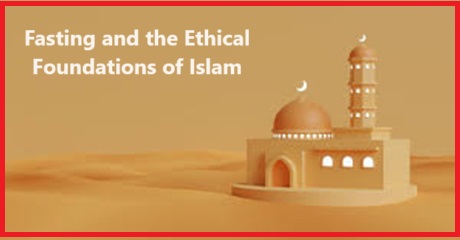Introduction:
Fasting and the Ethical Foundations of Islam, Fasting, or “Sawm,” holds a central place in the religious and ethical framework of Islam. As one of the Five Pillars of Islam, fasting during the holy month of Ramadan serves as a profound expression of devotion, discipline, and adherence to ethical principles. This write-up explores the significance of fasting in Islam, delving into its ethical dimensions and the transformative impact it has on individuals and communities.
Spiritual Discipline and Self-Control:
Fasting during Ramadan is not merely abstaining from food and drink; it is a holistic practice that extends to self-discipline and self-control. Muslims engage in this act of worship to cultivate a heightened awareness of their actions, thoughts, and words. The restraint exercised during fasting is a demonstration of the ethical principle of self-mastery, emphasizing the importance of controlling one’s desires and actions for spiritual growth.
Empathy and Compassion:
The experience of hunger and thirst during fasting fosters a deep sense of empathy and compassion for those who face poverty and hunger daily. By voluntarily subjecting themselves to physical discomfort, Muslims gain a firsthand understanding of the struggles faced by the less fortunate. This ethical dimension of fasting encourages charitable acts and reinforces the Islamic principle of caring for the marginalized and disadvantaged members of society.
Social Justice and Equality:
Fasting underscores the Islamic principles of social justice and equality. Regardless of one’s socioeconomic status, all Muslims participate in fasting, breaking down barriers of wealth and privilege. This collective experience promotes a sense of unity and solidarity among believers, emphasizing the ethical imperative of treating all individuals with dignity and respect, irrespective of their social standing.
Gratitude and Humility:
The act of fasting encourages Muslims to reflect on the blessings they have and to express gratitude for the sustenance provided to them. This gratitude cultivates humility, as individuals recognize their dependence on the divine and acknowledge the fragility of their existence. Fasting serves as a reminder that ethical conduct is rooted in acknowledging and appreciating the gifts bestowed upon individuals by a higher power.
Purification of the Soul:
Fasting is not only a physical exercise but also a means of purifying the soul. The ethical foundations of Islam emphasize the importance of maintaining a pure and righteous heart. Through fasting, Muslims strive to purify their intentions, thoughts, and actions, aligning them with the ethical teachings of Islam. This purification process contributes to the development of a morally upright and conscientious individual.
Discouragement of Negative Behavior:
During the month of Ramadan, Muslims are not only abstaining from physical needs but are also urged to refrain from negative behaviors such as gossip, lying, and anger. Fasting serves as a mechanism to cultivate patience, forgiveness, and a heightened awareness of one’s ethical responsibilities. This intentional avoidance of harmful actions reinforces the ethical teachings of Islam and promotes a positive transformation in individual behavior.
Sense of Community and Solidarity:
Fasting is not an individual endeavor; it is a communal act that strengthens the bonds within the Muslim community. The collective experience of breaking fast together fosters a sense of unity, cooperation, and shared responsibility. This communal aspect of fasting reinforces the ethical principle of working collaboratively for the betterment of society. Emphasizing that ethical conduct extends beyond individual actions to encompass the welfare of the entire community.
Conclusion:
Fasting in Islam transcends a mere physical act of abstaining from food and drink; it is a comprehensive ethical practice that shapes the character of individuals and communities. Through the principles of spiritual discipline, empathy, social justice, gratitude, purification, discouragement of negative behavior. And the sense of community, fasting serves as a transformative force in aligning Muslims with the ethical foundations of Islam. It is a journey that not only strengthens one’s connection with the divine. But also cultivates a deep commitment to ethical living and compassion towards others. Echoing the timeless principles of justice, humility, and mercy laid out in Islamic teachings.

g5xwd5
aq3c91
Thanks for sharing. I read many of your blog posts, cool, your blog is very good. https://accounts.binance.com/ka-GE/register?ref=RQUR4BEO
Very good post. I definitely love this website.
Continue the good work! https://glassi-greyhounds.Mystrikingly.com/
I don’t think the title of your article matches the content lol. Just kidding, mainly because I had some doubts after reading the article. Pumarehistro
Your writing always inspires me to learn more.
I love how well-organized and detailed this post is.
**mindvault**
mindvault is a premium cognitive support formula created for adults 45+. It’s thoughtfully designed to help maintain clear thinking
**sugarmute**
sugarmute is a science-guided nutritional supplement created to help maintain balanced blood sugar while supporting steady energy and mental clarity.
**glpro**
glpro is a natural dietary supplement designed to promote balanced blood sugar levels and curb sugar cravings.
**prodentim**
prodentim an advanced probiotic formulation designed to support exceptional oral hygiene while fortifying teeth and gums.
**breathe**
breathe is a plant-powered tincture crafted to promote lung performance and enhance your breathing quality.
**potent stream**
potent stream is engineered to promote prostate well-being by counteracting the residue that can build up from hard-water minerals within the urinary tract.
pgyzyq
**memory lift**
memory lift is an innovative dietary formula designed to naturally nurture brain wellness and sharpen cognitive performance.
Thank you for your sharing. I am worried that I lack creative ideas. It is your article that makes me full of hope. Thank you. But, I have a question, can you help me? https://www.binance.com/sk/register?ref=WKAGBF7Y